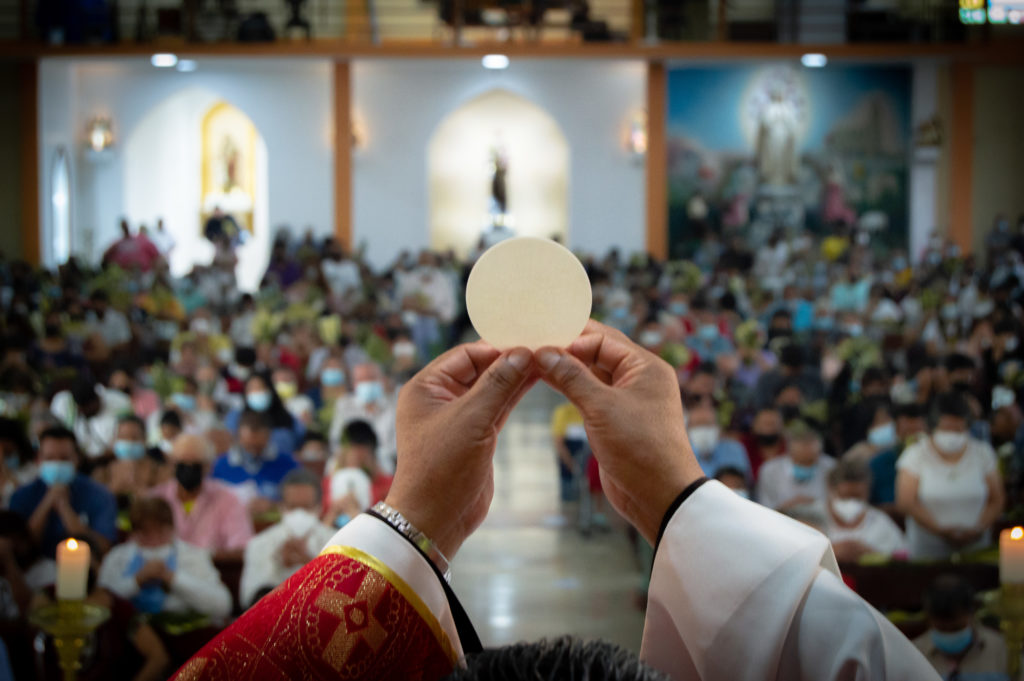The online Catholic journal One Peter Five recently ran a 1966 essay by Catholic writer Ida Friederike Görres (1901-1971), translated and with an introduction by Jennifer S. Bryson.
When does a person have a capacity for liturgy? Görres asked: a question at least as relevant today as it was 60 years ago.
She responded, in part:
- When he considers the worship of God to be an essential, necessary, irreplaceable, and central component of his faith and his religious existence: at least as important as serving others.
- When he regards the worship of God not strictly as a private need but rather as a duty of the fellowship of believers; so, not out of mere conviction and interiority, rather translatable into words, gestures, and symbols.
- When he has a religious relationship to holy Scripture as a relationship to the word of God and to the accumulated interpretations and explanations of Scripture over the course of the life of the Church, as a spiritual treasure that he measures in relation to the whole and wants to nourish from the whole.
A person does not have a capacity for liturgy, Görres continued:
- When he regards the worship of God as a relic of religious history that has been overcome, at best as a peripheral ornament of the true life of faith, which consists solely and essentially in serving others.
- When he himself practices the worship of God only occasionally, at his own discretion, according to his subjective mood and motive at the time, and he advocates this freedom for all other people as well.
- When it seems impossible and basically unacceptable for him to join with others except with small groups of people who are completely like-minded and have a similar temperament.
The belief that the true life of faith consists “solely and essentially in serving others” may be fine — I wouldn’t know — for those who are naturally drawn to and skilled at serving others.
But I, for one, need the whole one, holy, catholic and apostolic Church to work up the desire to serve anybody. I’m too incompetent, and way too selfish, to serve in any way without a massive amount of interior work and supernatural help.
Moreover, any service I might otherwise perform tends to be so overlain with the desire to be noticed, thanked, and affirmed — and for the service to be in some way reciprocated — that my motives tend to be highly suspect.
The good news is that, as Christ said, “Healthy people don’t need a doctor — sick people do.” Another cheering thought: “I came not to call not the righteous, but sinners. “
To have a capacity for liturgy is to acknowledge that I’m as mediocre, flawed, fallen, hypocritical, inconsistent, lukewarm, and capable of evil as the worst member of the Mystical Body.
But it’s also to acknowledge that I desire to follow in the footsteps of the “best” members of the Mystical Body: the martyrs and saints; the vast army of unheralded faithful who through the ages have laid down their lives in love for their friends.
I want to pass that desire on to others — which brings me to another reason I need the liturgy of the Church. When I come across someone who is also hungry, searching, and soul-sick, and who also desperately wants to order his or her life to the highest possible plane, I need something way more solid than my own self-styled “spiritual” frolic.
Don’t look to me, or to any human being or institution, no matter how well-intentioned.
Look to Christ, and to the Church he built upon Peter, against which the gates of hell will not prevail. The gates of hell would and have prevailed against me, lay movements, and even religious orders in five seconds flat: against the Church itself — the Mystical Body with Christ at its head — never.
I keep thinking of a trip I recently took to Detroit. I stayed with dear, generous friends. I saw some of the city’s art, parks, gardens, and neighborhoods.
But the center of my visit was a walk I took one sweltering weekday to an inner-city church that was a couple of miles away. The streets were deserted, the houses were abandoned, there was no store even to buy a bottle of water. I’d hoped to attend a noon Mass, but when I arrived the doors of the crumbling church were locked.
None of that mattered.
What mattered was my desire to be near the tabernacle. What mattered was that I was able to touch the door of the church, to genuflect, to whisper, Thank you, Lord, please keep me safe, please help me to be cheerful and kind.
Somewhere in the world, that very moment, a priest in direct apostolic succession from Christ was saying, “On the night he was betrayed and entered willingly into his Passion”; somewhere in the world the consecrated Host was being elevated; somewhere in the world a priest was saying, “Thank you for counting us worthy to stand in your presence and minister to you.”
The worshippers at those Masses were there for me. I had walked through the heat for them. We were all there, by extension, for the whole world.
If I have a capacity for liturgy, Görres’ piece reminds me, it emerged from no virtue of my own. The fact is: Who but the Church would have me?

